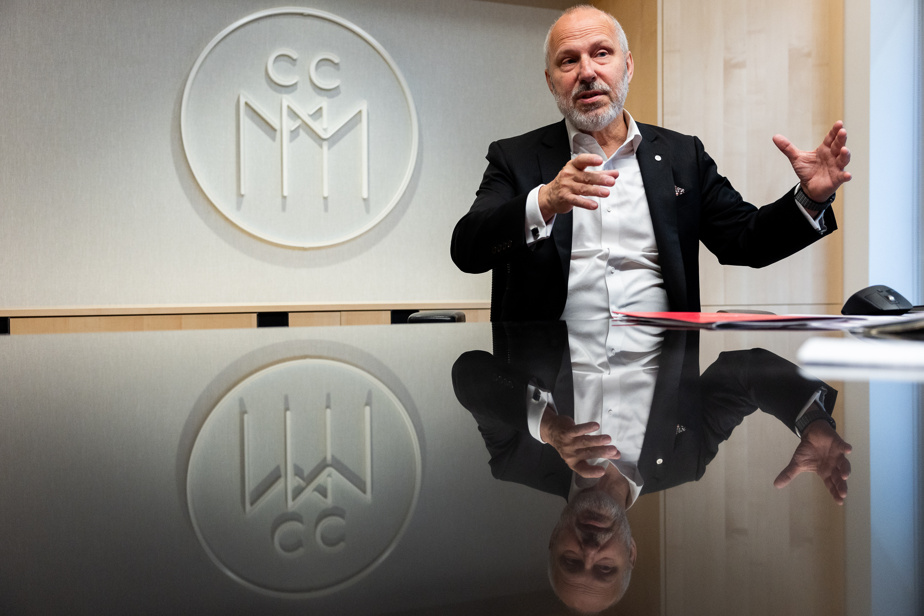Michel Leblanc, CEO of the Chamber of Commerce of Metropolitan Montreal (CCMM), began his 15th year in January as CEO of the organization which defends the interests of the business community. He is able to measure the progress made and appreciate the transformations experienced by the Montreal economic environment which, according to him, has gained in confidence despite the emergence of new issues.
15 years ago, in January 2009, we were in the middle of the international financial crisis which hit many Montreal businesses hard and undermined economic activity.
The unemployment rate was over 11% and the metropolitan region was embroiled in a series of crises: the choice of locations for the CHUM and CUSUM, the reconfiguration of the Turcot interchange, the construction of the new Champlain Bridge, etc.
It is in this context that Michel Leblanc begins his mandate as CEO of the CCMM. An economist by training, he was a consultant at Secor before taking charge of In Vivo, the life sciences cluster, the first industrial cluster to be established in Montreal.
“My role during the financial crisis was to articulate the needs and concerns of the Montreal business community, to synthesize them well and to express them well,” recalls Michel Leblanc, who had a certain mastery of economic issues since he had created the CCMM’s three-year strategic plan in 2002, as a consultant for Secor.
A photo on his office wall illustrates the city of Montreal seen from the South Shore, taken 10 years ago. The Canadiens towers are absent, as are the residential towers of Griffintown, while the new National Bank tower or that of 700 Saint-Jacques were not even designed.
Montreal has therefore followed a very positive trajectory over the past 15 years, with in particular a strong recovery in real estate activity in the city centre. But new, very worrying issues have emerged and will require strong and concerted action, underlines the CEO of the CCMM.
“Mobility and transportation in Montreal are very problematic and security has become an extremely worrying issue. People are starting to fear going near certain metro stations, homelessness and the opioid crisis are taking a significant toll,” notes Michel Leblanc with certain desolation.
20 years ago, a city like Seattle was an example of urban development, says the president of the Chamber of Commerce, while today, we are going to Seattle to understand how a city center can become deconstructed. This is what Montreal must avoid doing, according to him. We must avoid weakening the trust we have managed to build.
The government of Quebec must provide more social support to Montreal, it must invest more in sanitation, cleanliness and social housing, he believes, while the city risks finding itself in a precarious financial situation due to the deterioration of the land value of office towers.
“The vacancy rate of the towers is too high, there is a risk that the value of the assets will be reduced, which will reduce tax revenues,” indicates Michel Leblanc.
If he wanted to meet me to take stock of his 15 years as president of the Chamber of Commerce of Metropolitan Montreal, is it because he has reached a crossroads and wants to get even more actively involved in the future of the Quebec metropolis?
Last March, a poll carried out for the Projet Montréal party put the name of Michel Leblanc as a potential candidate for mayor of Montreal, just as those of Sophie Brochu and Mélanie Joly were tested.
“What interests me is Montreal, well before politics. As an economist, I have always wondered how to reactivate a metropolis that is in relative decline. Montreal is doing well as an entity, but it is its downtown that is becoming worrisome,” he observes.
Since the end of the pandemic, Michel Leblanc has actively campaigned for companies to bring their teams back to the office, but he notes that many of them are reluctant to require an increased presence of their workforce even if it affects their productivity.
“It’s also somewhat understandable. Why ask your employees to come to the office if it’s difficult to get there because of traffic flow issues and if they feel like they’re not safe when they come downtown?” laments the CEO of the Chamber of Commerce of Metropolitan Montreal, who, at 61, is ready for new challenges.




